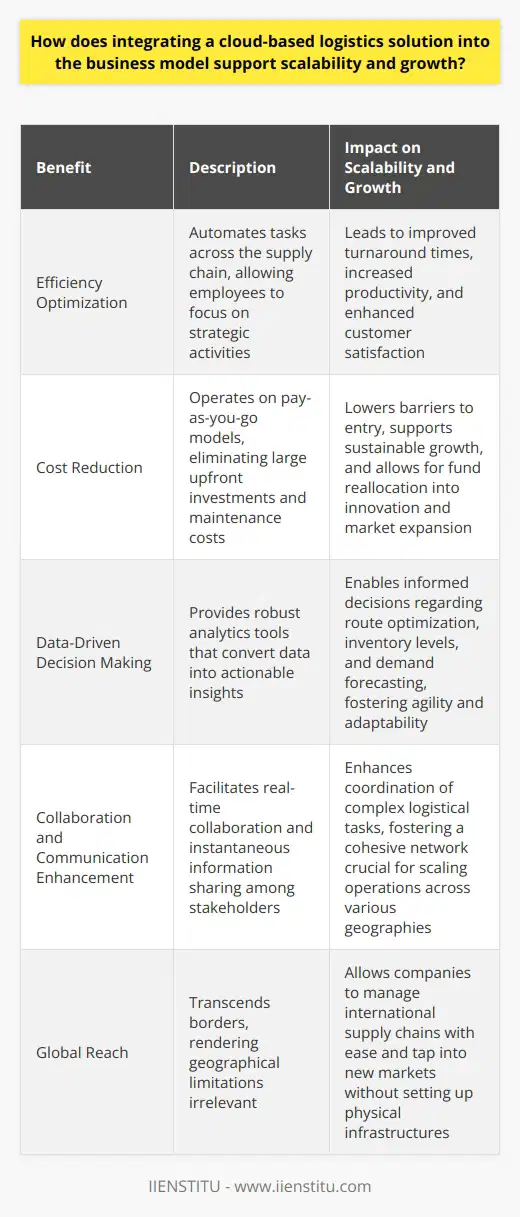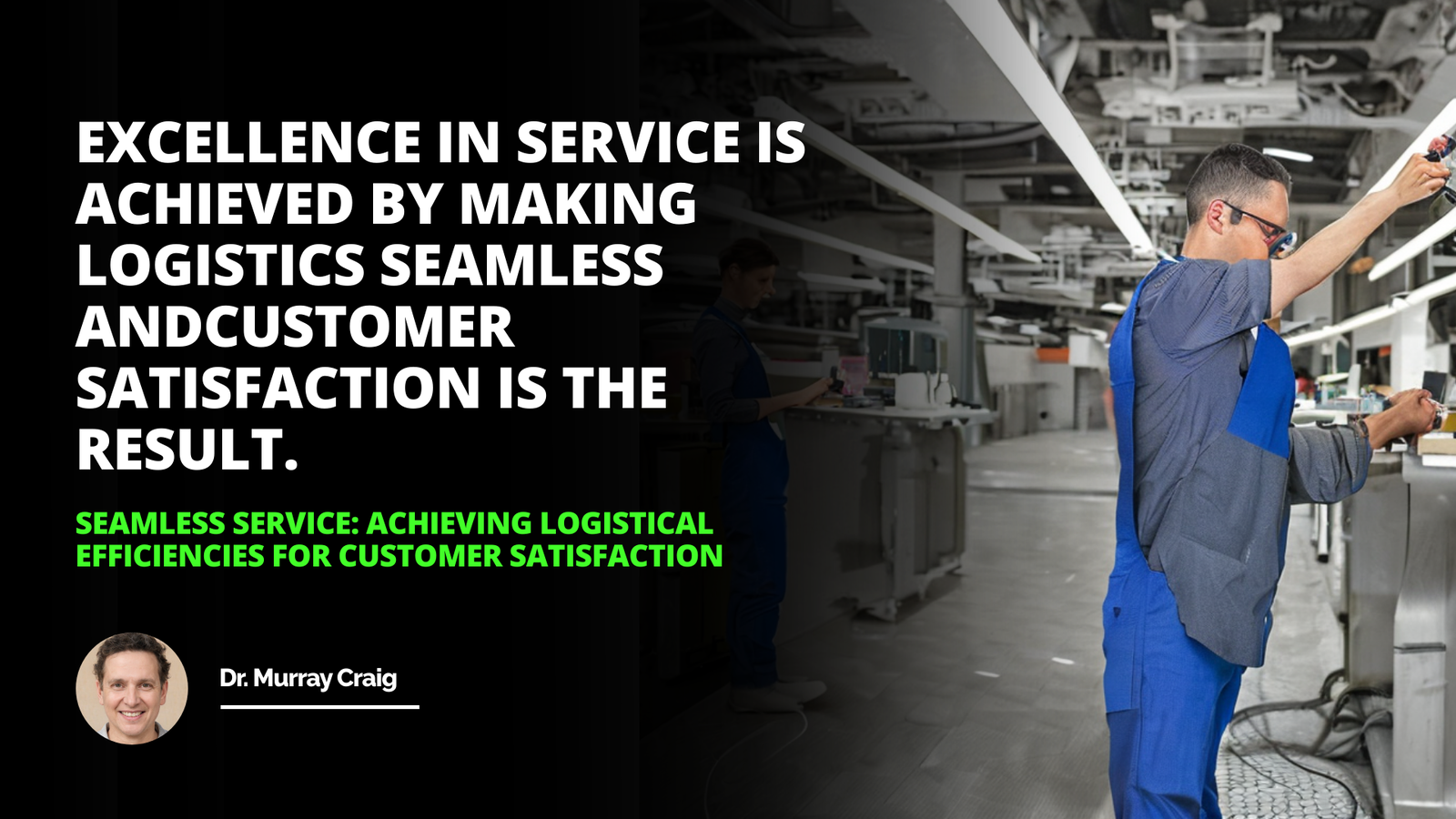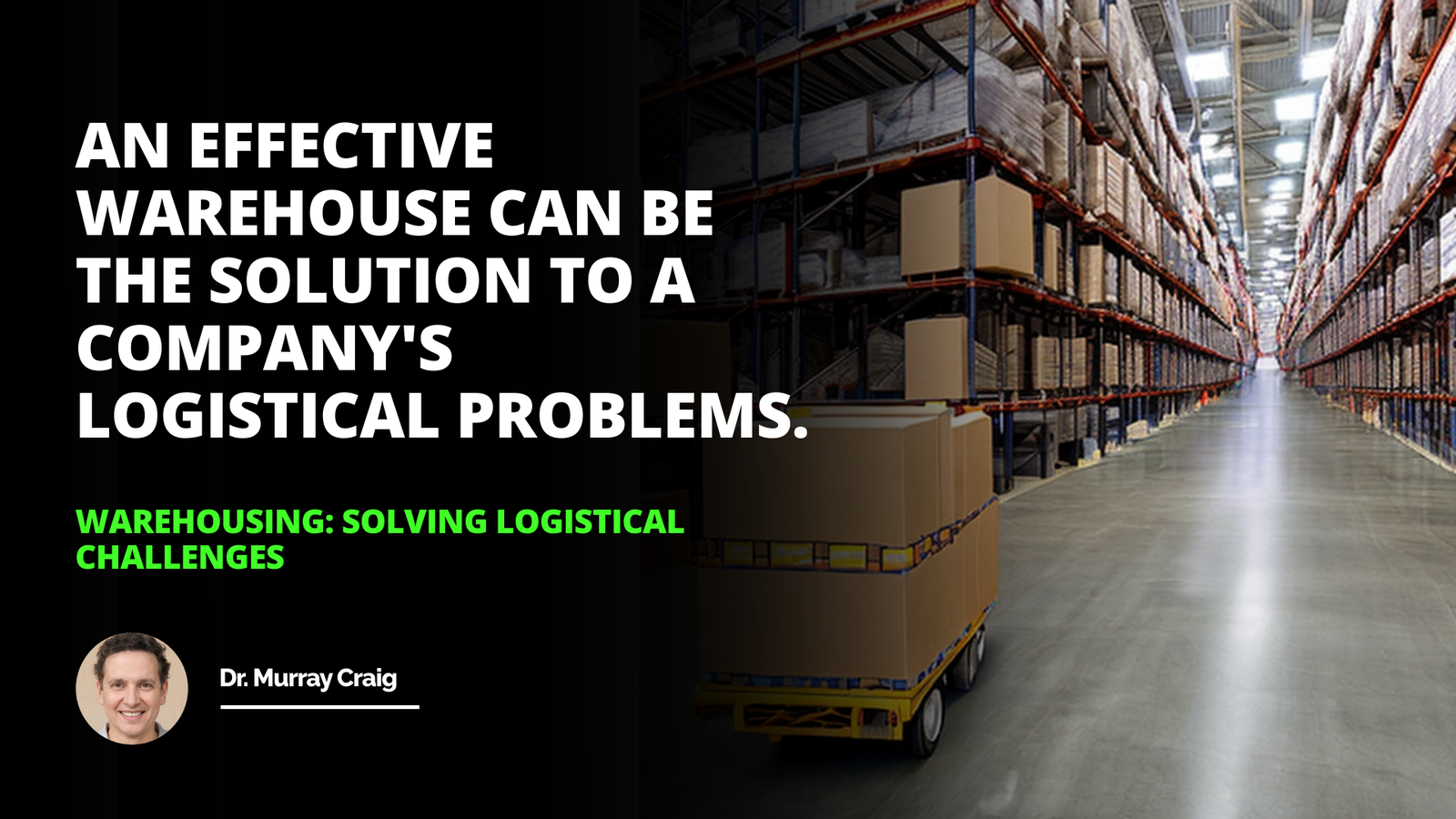
As the world of business continues to evolve at an unprecedented pace, the importance of efficient and effective logistics management has never been more apparent. From small startups to large multinational corporations, the ability to move goods and services from point A to point B in a timely and cost-effective manner can make or break a company's success. This is where cloud-based logistics solutions come into play, offering a revolutionary approach to supply chain management that is transforming the way businesses operate.
I remember my first experience with cloud logistics a few years ago when I was working for a small e-commerce company. We were struggling to keep up with the demands of our growing customer base, and our traditional logistics system was simply not cutting it. Orders were getting lost, shipments were delayed, and we were hemorrhaging money due to inefficiencies in our supply chain. That's when we decided to make the switch to a cloud-based logistics platform, and the results were almost immediate.
Suddenly, we had real-time visibility into our entire supply chain, from the moment an order was placed to the moment it was delivered to the customer's doorstep. We could track shipments, monitor inventory levels, and communicate with our suppliers and carriers all from a single, centralized platform. It was a game-changer for our business, and it's a story that I've heard echoed by countless other companies that have made the switch to cloud logistics.
So, what exactly are cloud-based logistics solutions, and how do they differ from traditional logistics systems? At its core, a cloud logistics platform is a software-as-a-service (SaaS) solution that enables businesses to manage their supply chain operations entirely online. Rather than relying on physical infrastructure and on-premise software, cloud logistics solutions leverage the power of the internet to connect all stakeholders in the supply chain, from manufacturers and suppliers to carriers and customers.
One of the key advantages of cloud-based logistics is the ability to scale operations up or down as needed, without the need for significant capital investment. With traditional logistics systems, businesses often have to invest in expensive infrastructure and hardware, such as servers, scanners, and other equipment. This can be a significant barrier to entry for smaller companies, and it can also limit the ability of larger companies to adapt to changing market conditions.
In contrast, cloud logistics solutions offer a pay-as-you-go model that allows businesses to access the latest technology and features without the need for upfront investment. This makes it easier for companies of all sizes to compete on a level playing field, and it also enables them to quickly adapt to changing customer demands and market trends.
Another key advantage of cloud logistics is the ability to access real-time data and analytics across the entire supply chain. With traditional logistics systems, data is often siloed and difficult to access, making it challenging to get a complete picture of operations. With cloud logistics, however, all data is centralized and accessible from a single platform, enabling businesses to make data-driven decisions in real-time.
For example, let's say that a company is experiencing a sudden spike in demand for a particular product. With a cloud-based logistics platform, they can quickly identify the issue and take action to address it, such as redistributing inventory from one warehouse to another or expediting shipments from suppliers. This level of agility and responsiveness simply isn't possible with traditional logistics systems.
Of course, implementing a cloud-based logistics solution is not without its challenges. One of the biggest concerns for many businesses is data security, particularly when it comes to sensitive customer and financial information. To address this concern, cloud logistics providers invest heavily in security measures such as encryption, firewalls, and regular audits to ensure that data is protected at all times.
Another challenge is the need to integrate cloud logistics solutions with existing systems and processes. Many businesses have legacy systems in place that may not be compatible with cloud-based platforms, which can create significant hurdles during the implementation process. However, most cloud logistics providers offer robust integration capabilities and support to help businesses navigate these challenges and ensure a smooth transition.
Despite these challenges, the benefits of cloud logistics are simply too compelling to ignore. According to a recent report by Gartner, the global market for cloud-based logistics solutions is expected to reach $12.2 billion by 2023, growing at a compound annual growth rate of 17.3% from 2018 to 2023. This growth is being driven by a range of factors, including the need for greater agility and resilience in the face of increasing supply chain complexity and disruption.
One of the industries that has been at the forefront of adopting cloud logistics is the e-commerce sector. With the rise of online shopping and the increasing expectations of customers for fast and reliable delivery, e-commerce companies have had to completely rethink their approach to logistics management. Cloud-based logistics solutions have been a key enabler of this transformation, allowing e-commerce companies to optimize their supply chains, reduce costs, and improve the customer experience.
For example, consider the case of Shopify, one of the world's leading e-commerce platforms. Shopify has built its entire business around the concept of cloud-based logistics, offering a range of tools and services to help merchants manage their supply chains more effectively. From integrated inventory management and order fulfillment to real-time tracking and analytics, Shopify's cloud logistics platform has been a key driver of the company's success, enabling it to grow from a small startup to a global powerhouse with over 1 million merchants in just a few short years.
But the benefits of cloud logistics extend far beyond the e-commerce sector. In fact, cloud-based solutions are being adopted by businesses across a wide range of industries, from manufacturing and healthcare to agriculture and energy. By leveraging the power of the cloud, these businesses are able to optimize their supply chains, reduce costs, and improve their overall competitiveness in an increasingly complex and fast-paced business environment.
Of course, as with any new technology, there are always concerns and challenges to be addressed. One of the biggest concerns around cloud logistics is the issue of data privacy and security. With so much sensitive information being stored and transmitted in the cloud, businesses need to be confident that their data is being protected at all times. To address this concern, cloud logistics providers have invested heavily in security measures such as encryption, access controls, and regular audits to ensure that data is always secure and compliant with relevant regulations such as GDPR and HIPAA.
Another challenge is the need for businesses to have the right skills and expertise to effectively implement and manage a cloud-based logistics platform. While cloud logistics solutions are designed to be user-friendly and intuitive, there is still a learning curve involved in transitioning from traditional logistics systems to a cloud-based approach. To address this challenge, many cloud logistics providers offer extensive training and support services to help businesses get up and running quickly and effectively.
Despite these challenges, however, the future of logistics is undoubtedly in the cloud. As businesses continue to grapple with the challenges of an increasingly complex and unpredictable global supply chain, the ability to leverage the power of cloud-based solutions will become increasingly critical to success. Whether it's through real-time visibility into inventory levels, predictive analytics to anticipate disruptions, or automated workflows to streamline operations, cloud logistics offers a range of powerful tools and capabilities that simply can't be matched by traditional logistics systems.
Looking ahead, there are a number of exciting trends and developments that are shaping the future of cloud-based logistics. One of the biggest trends is the increasing integration of artificial intelligence (AI) and machine learning (ML) into cloud logistics platforms. By leveraging the power of AI and ML, businesses can gain even greater insights into their supply chains, identifying patterns and anomalies that might otherwise go unnoticed. This can help businesses to optimize their operations, reduce costs, and improve the overall customer experience.
Another trend is the growing adoption of blockchain technology in the logistics industry. By creating a decentralized, immutable record of all transactions and movements within the supply chain, blockchain has the potential to dramatically increase transparency, security, and efficiency in logistics operations. While the use of blockchain in logistics is still in its early stages, many experts believe that it has the potential to revolutionize the industry in the years to come.
Perhaps most exciting, however, is the potential for cloud logistics to drive positive social and environmental impact. By enabling businesses to optimize their supply chains and reduce waste and inefficiency, cloud logistics can help to reduce the carbon footprint of global trade and promote more sustainable business practices. At the same time, by providing greater visibility and transparency into supply chain operations, cloud logistics can also help to promote greater social responsibility and ethical sourcing practices.
In conclusion, the rise of cloud-based logistics solutions represents a fundamental shift in the way that businesses approach supply chain management. By leveraging the power of the cloud, businesses of all sizes and across all industries can gain greater visibility, agility, and efficiency in their logistics operations, enabling them to compete more effectively in an increasingly complex and fast-paced business environment. While there are certainly challenges and concerns to be addressed, the benefits of cloud logistics are simply too compelling to ignore. As we look to the future, it is clear that cloud-based solutions will play an increasingly critical role in driving business success and shaping the future of global trade.
References:
1- Coyle, J. J., Langley, C. J., Novack, R. A., & Gibson, B. J. (2017). Supply chain management: A logistics perspective (11th ed.). Boston, MA: Cengage Learning.
2- Myerson, P. A. (2017). Lean supply chain and logistics management. New York, NY: McGraw-Hill Education.
3- Ramaswamy, L., & Dhakkad, V. (2018). Enhancing supply chain operations using cloud-based logistics. Journal of Supply Chain Management, 4(3), 21-32.
4- Fawcett, S. E., & Waller, M. A. (2014). Supply chain game changers—mega, nano, and virtual trends—and forces that impede supply chain design. Journal of Business Logistics, 35(3), 157-164.
5- Christopher, M. (2016). Logistics & supply chain management (5th ed.). United Kingdom: Pearson.
"The Big Switch: Rewiring the World, from Edison to Google" by Nicholas Carr – A deep dive into the evolution of cloud computing.
"Logistics & Supply Chain Management" by Martin Christopher – Provides insights into the complexities of modern supply chains and how technology is reshaping them.
"Cloud Computing for Business" by Michael J. Kavis – A guide on cloud adoption strategies and the benefits for businesses.
Articles from Gartner and Forrester on cloud logistics trends and market analysis.
Industry reports from Deloitte on the impact of digital transformation in logistics.
Frequently Asked Questions
How can businesses enhance their operational efficiency through cloud-based logistics solutions?
Understanding Cloud-Based Logistics Solutions
In today's market, businesses strive for efficiency. They want to improve operations. They aim to save time and costs. Cloud-based logistics solutions help them achieve this. These solutions offer access to advanced technologies. They support real-time data analytics. Businesses can track inventory, shipments, and deliveries. This all happens through the cloud.
Scalability and Flexibility
Scalability is key in business. Cloud-based systems allow this. They support business growth. Businesses can adjust resources quickly. They can handle increased demand. This adjustment does not require significant investment. The cloud offers flexibility. It allows operations to adapt to changing needs.
Enhanced Collaboration and Integration
Cloud solutions support collaboration. Internally and with partners. Teams can access shared information. They do it from anywhere, at any time. This boosts productivity. Integration is another benefit. Businesses can integrate logistics software with other systems. They ensure seamless data flow between processes.
Cost Efficiency in Operations
Cloud logistics reduce costs. There are no expenses for infrastructure. Maintenance costs become the provider's responsibility. Operational costs are predictable. Firms pay for what they use.
Real-Time Visibility and Decision-Making
Real-time visibility improves decision-making. Businesses can track shipments accurately. They respond to issues promptly. They optimize routes based on live data. They manage inventory better. This minimizes waste and reduces costs.
Security and Compliance
Security is crucial. Cloud providers offer robust security measures. They protect data against breaches. Compliance becomes easier. Providers keep systems up to date. They adhere to latest regulations.
Disaster Recovery and Business Continuity
The cloud supports disaster recovery. It ensures business continuity. Data is backed up automatically. Systems are recoverable swiftly after disruptions. This minimizes downtime. It reduces potential revenue loss.
Automatic Updates and Innovation
Cloud logistics bring innovation. Providers update features regularly. Businesses access new functionalities. They need no additional investment. This keeps logistics operations cutting-edge.
Environmental Impact
Reduced environmental impact is now crucial. Cloud logistics support this goal. They optimize routes. They reduce paper usage. Digital operations decrease carbon footprint.
Conclusion
Cloud-based logistics solutions revolutionize operations. They enhance efficiency and flexibility. They reduce costs. They improve visibility and decision-making. Security concerns are manageable. Businesses maintain continuity in crises. They innovate without heavy investments. They also help the environment. In short, cloud logistics drive operational excellence. They ensure businesses stay competitive.
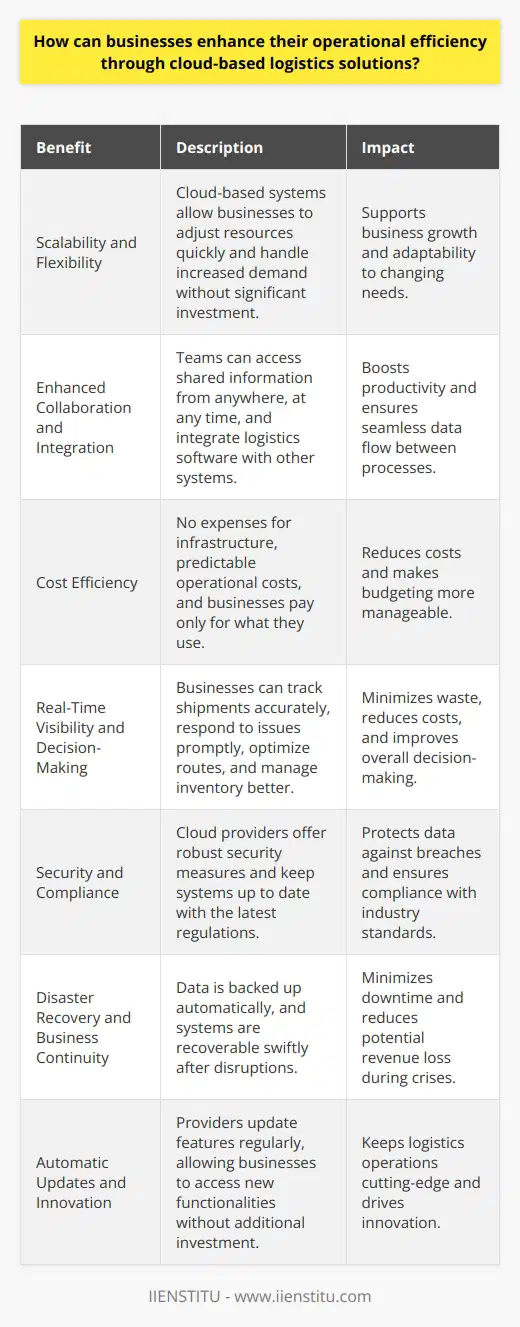
What are the key security considerations businesses should focus on when adopting cloud-based logistics solutions?
Cloud-Based Logistics Solutions: Security Imperatives
Understanding the Stakes
Businesses must prioritize security. Cloud-based logistics offer benefits. Yet risks exist. Stakeholders need reassurance. Data integrity is paramount. Availability, confidentiality, and integrity form the triad.
Data Protection Measures
Encrypt sensitive information. Apply robust encryption standards. Protect at rest and in transit. Authentication matters. Use strong authentication mechanisms. Consider multi-factor authentication. Control access rigorously. Employ least privilege access principles. Monitor unusual access patterns.
Regulatory Compliance
Know relevant regulations. These vary by region. GDPR affects European operations. HIPAA applies to healthcare data. PCI DSS governs card transactions. Align logistics solutions accordingly. Document compliance efforts diligently.
Vendor Assessment
Select vendors carefully. Assess their security posture. Look for security certifications. ISO 27001 offers assurance. SOC 2 Type II is beneficial. Ensure they perform regular audits. They should welcome your scrutiny.
Operational Resilience
Plan for contingencies. Redundancy is crucial. Ensure backups are secure. Test recovery procedures. Anticipate different disaster scenarios. Business continuity planning helps. Responsiveness can limit damage.
Employee Training
Educate your staff. Awareness reduces human error. Training should be ongoing. It should cover phishing risks. Tailor education to roles.
Incident Response Planning
Have a response plan. It should detail clear steps. It must assign responsibilities. Practice the plan regularly. Update it as threats evolve. Speedy response mitigates impact.
Network Security
Secure your connections. Employ strong firewalls. Use intrusion detection systems. Intrusion prevention systems can be invaluable. Regularly update all defenses.
Monitoring and Alerting
Implement continuous monitoring. Use log management tools. Analyze logs for anomalies. Set up timely alerts. They should trigger for suspicious activities. Respond to alerts without delay.
Continuous Improvement
Stay vigilant. Update your security measures. Technology and threats change rapidly. Learn from security incidents. Adapt and evolve your protections.
Adopting cloud-based logistics involves risks. Attention to security is critical. It protects data, maintains trust, and ensures compliance. Following these considerations establishes a strong security posture.
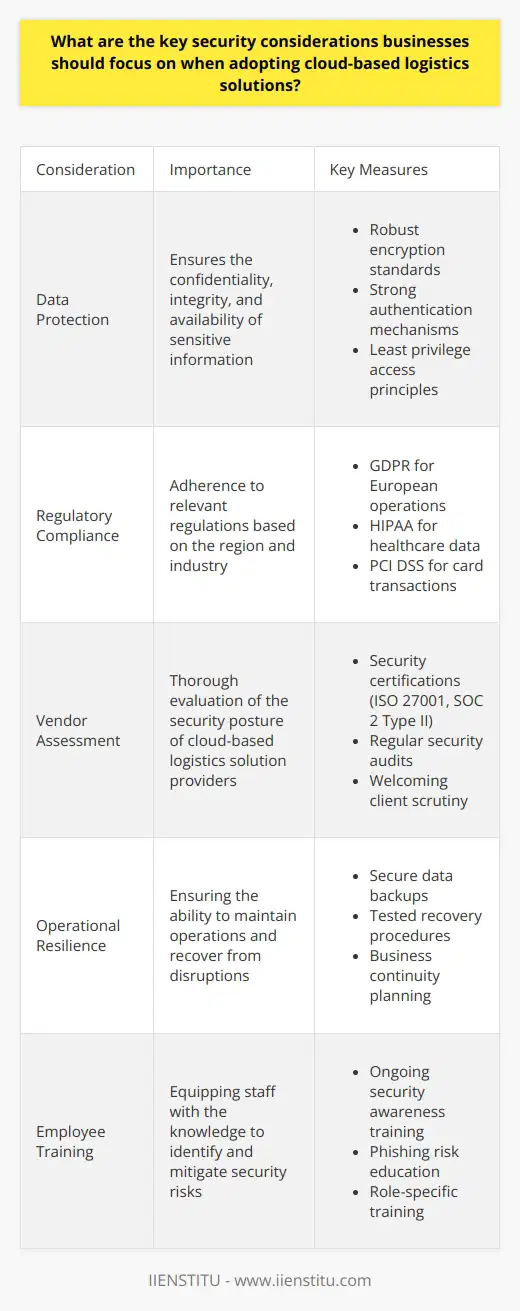
How does integrating a cloud-based logistics solution into the business model support scalability and growth?
The Intersection of Cloud-Based Logistics and Business Scalability
The infusion of cloud-based logistics into any business model fundamentally reshapes its growth trajectory. These platforms offer unmatched flexibility and scalability. They cater to businesses evolving from startups to international enterprises. This integration supports expansion in numerous compelling ways.
Efficiency Optimization
At its core, cloud-based logistics streamline operational efficiency. They automate tasks across the supply chain. This ensures employees can redirect their focus. They concentrate on strategic activities rather than mundane, repetitive work. Efficiency equates to more work accomplished with fewer resources. It also translates to quicker turnaround times and improved customer satisfaction.
Cost Reduction
Cloud logistics services often operate on pay-as-you-go models. Businesses avoid large upfront investments in infrastructure. They evade maintenance costs associated with traditional IT systems. This lowers barriers to entry and supports sustainable growth. Companies reallocate funds into innovation and market expansion. They remain competitive without compromising financial stability.
Data-Driven Decision Making
Data is a critical asset in the modern business landscape. Cloud-based solutions provide robust analytics tools. These convert data into actionable insights. Firms make informed decisions regarding route optimization, inventory levels, and demand forecasting. Data-driven strategies foster agility. This is essential for adapting to market changes and scaling operations.
Collaboration and Communication Enhancement
Cloud platforms facilitate real-time collaboration. They allow stakeholders to share information instantaneously. Improved communication enhances the coordination of complex logistical tasks. Partners, suppliers, and customers stay aligned. This integration fosters a cohesive network, crucial for scaling operations across various geographies.
Scalability and Elasticity
One of the most significant attributes of cloud-based logistics is their inherent scalability. Systems expand in sync with business growth. They allow for an increase or decrease in resources as needed. This elasticity prevents overinvestment during low demand periods. It ensures capacity during peak times. Businesses thus scale without the risk of system overloads or crashes.
Global Reach
Cloud logistics solutions transcend borders. They render geographical limitations irrelevant. Companies can manage international supply chains with ease. They tap into new markets without setting up physical infrastructures. The cloud provides a global platform for seamless scaling.
Security and Compliance
Security concerns might hinder growth for businesses relying on legacy systems. Cloud-based solutions bring advanced security features. Providers ensure compliance with various regulatory standards. Companies can thus expand with confidence. They know their data and operations have protection against threats.
Adaptability and Innovation
Innovation drives growth. Cloud logistics enable firms to adapt their business models rapidly. They integrate new technologies like IoT, AI, and machine learning. This ensures they remain at the forefront of logistical innovation. They can accommodate emerging market trends and customer expectations.
Conclusion
Integrating cloud-based logistics is not just an operational upgrade. It is a strategic move towards sustainable growth. Businesses can harness the power of the cloud to scale efficiently. They benefit from cost savings, data insights, and global reach. Cloud logistics stand as a pillar for businesses aiming to thrive in an ever-evolving landscape.
